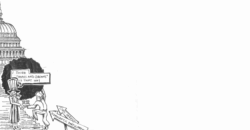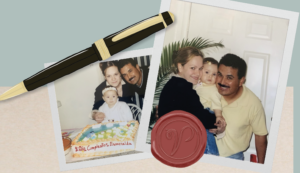I LOVE being an English major. I’ll tell anyone who will listen how much I love it. I’ve done everything from reading Shakespeare and writing analytical papers about classics like Dracula to wildly unconventional assignments like watching movies, staging plays, and literally coloring with crayons. I can almost guarantee that I’m having more fun than those of you sleeping through financial accounting or drowning in organic chemistry. But the biggest downside? Most people don’t see it as anything more than trivial or useless.
Personally, I was amazed by the incredible array of choices I had upon coming to Georgetown decidedly undecided. Justice and Peace Studies? Global and Comparative Literature? Women’s and Gender Studies? Who knew there were so many options? After exploring, I was drawn to English simply because I love reading and writing. I’ve had the opportunity to engage with an impressive variety of genres, topics, and characters (while writing surprisingly few of those traditional five-paragraph essays we’re all too familiar with) under the guidance of some of the most enthusiastic and genuine professors. I can fill my schedule with classes that focus on any time period, author, or subject that interests me, all while being challenged to think deeper, write better, and work creatively. Outside the classroom, I’ve experienced tailored visits to Special Collections in Lau, trips to museums and memorials, and viewings of Georgetown’s art galleries and theater performances. However, some at Georgetown would argue that only a handful of majors—excluding English and many other humanities majors—are “productive” or offer a path to secure, profitable employment.
Despite my passion for my major, I won’t pretend it’s not frustrating to watch everyone around me feel so sure of their future career prospects. It often feels like half my friends have Hillternships while the other half have already procured positions at reputable companies for summer 2025 (yes, 2025). And yet here I am, clueless as to where my career path may take me—which can be pretty terrifying.
I’m sure we’ve all experienced this inevitable line of questioning in some way: “What do you want to do?” followed by “Oh, it’s okay, you don’t have to know yet!” all in the same breath. I have to admit, I used to get nervous any time an adult would ask me what I was studying, fearing disapproval or the imminent “…and what do you plan to do with that?” Sometimes, I would even just say psychology, thinking it would be a more acceptable answer and more easily associated with respectable career prospects (I’m a psych minor, so technically not a lie… but still).
I think part of this discomfort (and let’s be honest, slight jealousy) stems from Georgetown’s competitive atmosphere. We undeniably tend to be hyper-focused on networking, finding internships, perfecting our LinkedIn profiles, and fighting for the too-few spots in Georgetown’s most prestigious clubs. If our collective attitude is so career-focused, it seems only reasonable to align our academic interests with what we believe will bring us the most future success. In one of my English classes, we started the semester by introducing ourselves and sharing why we chose English. When half the room responded with “law school,” I felt humbled by my comparatively trivial response: “I just like to read and write.”
However, there are many benefits to majoring in English or other disciplines in the humanities. A recent Oxford study titled “The Value of Humanities” found that humanities degrees offer a swath of career benefits including the ability to work in a diverse array of fields with high job satisfaction rates. It also stresses how humanities majors develop resilience, flexibility, and adaptability, all of which are important in the ever-evolving job market. My English classes have definitely fostered these; I’m often given unique assignments that test the traditional boundaries of homework and push me out of my comfort zone. Who knew I could create my own website, or translate and act in my own production of Macbeth? Having these skills can better prepare you for inevitable (and often unforeseen) drastic changes in our society, such as a global pandemic. I don’t mean to suggest that other majors wouldn’t teach you the ability to adjust, but humanities majors prove particularly effective in helping you hone such a skillset.
Additionally, many employers value the “soft skills” that are often associated with humanities majors. These include critical thinking, creative problem-solving, effectively synthesizing information, and teamwork. The ability to write well and communicate effectively will always be a valuable asset, regardless of your desired career path. I’ve begun mastering such skills through core English classes like “Critical Methods,” but also electives such as “Disability in the Arts” and “Hybrid Forms” that have introduced me to more powerful and inclusive ways of communicating. Again, this isn’t to say that a finance or biology major wouldn’t develop these capabilities—one would hope that every Georgetown-educated student will—but these skills are actively practiced and promoted as a core tenet of humanities disciplines.
Aside from these ominous ever-present thoughts of the future that run rampant at Georgetown, consider how your major and course load impact you right now. If the average course load is 15 credits, you’re spending roughly 200 hours in class. Over eight semesters, that’s 16,000 hours of your life you’ll never get back (and not to mention an absurd amount of tuition money). You should spend this time delving deep into the subjects you find most engaging, rather than doing something you feel will be the most monetarily rewarding or earn you the most respect. I’ve found value in spending this time in English classes: for me, nothing beats reading good books, exploring a range of mediums, and having captivating conversations.
Yes, this piece is a plug for being an English major. But more importantly, it doesn’t matter what subject it is—you should do what makes you happy. I don’t mean to sound like an inspirational quote generator, but think about how much time, money, and energy you put in while at Georgetown. I’m not discouraging you from sticking with that “profitable” major or adhering to the pre-med track if that’s where your heart is. If the thought of an illustrious career path is what brings you joy or just gets you through your classes, power to you.
What I specifically want to discourage in our hyper-motivated community is feeling poorly about yourself or questioning your academic passions because of what others are doing. Contrary to popular belief: your college major won’t define the rest of your life. And if you’re considering a major in the humanities, it almost certainly won’t lock you into a specific career, limit your prospects, or hinder your ability to be successful. Georgetown has so many academic resources, opportunities, and wonderful people devoted to the humanities that I’ve had the privilege to learn from, all of which have made this path so worth it. I urge you to take full advantage of these amazing options Georgetown has to offer–trust me, you won’t regret it.






